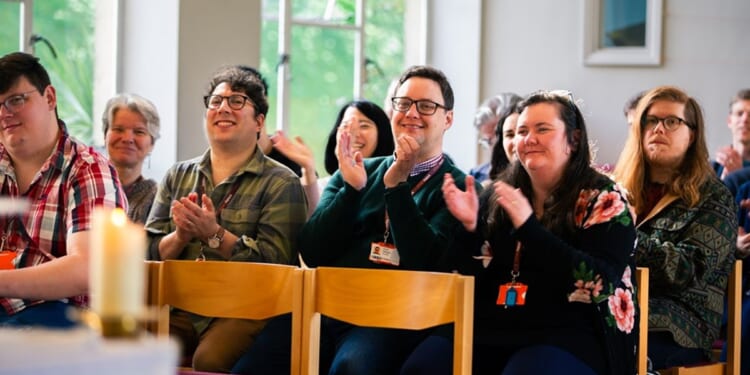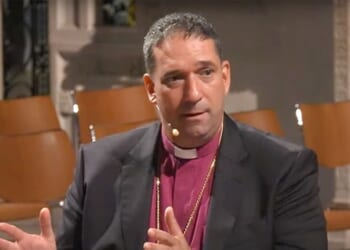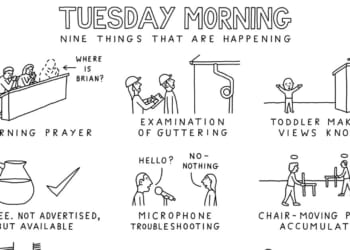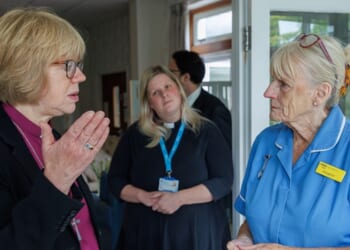WHEN the Revd Chantal Noppen was undergoing her ordination training at Westcott House, Cambridge, from 2010 to 2013, she felt that “there were so many things stacked up against it being a comfortable, smooth experience.”
There was, she felt, a constant sense of “unwritten rules and expectations” that she was meant to abide by, and she struggled with the “Cambridge” style of learning. She also struggled with the dynamics of people’s communication. “People simply did not say what they meant or always mean what they said. As I turned out to be far more literal than I realised, again this led to a pretty constant feeling of not fitting in.”
Having joked that she had ADHD as a young adult (but receiving a diagnosis only in December 2022), she explained that, when she was growing up, ADHD had widely been seen as something that affected “naughty boys”.
“I think if I trained now, it would be very different, because there’s much more of an awareness around neurodivergence. But, at that point, there just wasn’t, and I didn’t fit.” It didn’t shake her sense of calling, however: “God very much wanted me and wants me in ministry, and there’s a specific niche that I have that I’m called to do and be.”
Mthr Noppen was an assistant curate in Newcastle diocese and then, for eight years, an incumbent in Durham diocese. She moved out of parish ministry in May 2024, and is now the national co-ordinator of Inclusive Church. She has permission to officiate in Durham diocese, and provides local ministerial support where needed.
She describes her calling, which came at the age of 14, as being to work with “those on the margins”. She unpacks that as being “that bridge point, walking in the space between: helping people navigate the boundaries and feel that there is hope, affirmation, and community available; to offer a voice of, and for, the silenced and overlooked; to be willing to challenge the status quo and call out injustice, believing and hoping for change and more equitable practices.
“I’ve started loosely describing this as being an ‘accidental prophet’, because I didn’t look for this. I don’t deliberately not fit. It’s been a very uncomfortable journey, and has featured a lot of wrestling — with myself, with the Church, with the expectations and narrow boundaries usually in place.
“But now, in the role I now have with Inclusive Church, having served as a diocesan adviser in women’s ministry (DAWM) — and published an audit into maternity provision across the C of E — and as a member of General Synod, and advocate for estates ministry, I feel it’s making more sense; and, with this hindsight, I can understand my ministry journey as clearly showing me to this point.”
THE NHS defines neurodiversity as “an umbrella term used to describe natural differences in how individuals’ brains think and process information”. Common examples of neurodiversity include, but are not limited to, autism-spectrum condition (ASC), ADHD, dyslexia, dyspraxia, and Tourette’s syndrome.
Under the 2010 Equality Act, all colleges, universities, and theological-education institutions (TEIs) are required to make “reasonable adjustments” for those with disabilities who need them. Some of the most significant adjustments have been in alternative assessments, which can include assessed conversations and oral presentations. These assessments acknowledge the difficulties that some students face.
The disability adviser and specialist study-support tutor at Trinity College, Bristol, Mel Lucas, says that many of her students with dyslexia and ADHD struggle to start and finish tasks, and are easily distracted, especially in noisy environments such as the chapel, the dining hall, or community coffee gatherings. These settings can also be challenging for students with ASC, she says. Those with dyspraxia often find it difficult with organisation. Yet the biggest challenges for neurodiverse students is the struggle to mask or not to mask, and the prospect of essay-writing.
“Those with dyslexia often struggle with transferring their thoughts and ideas into a cohesive written format; those with ADHD can be overwhelmed by distractions and their own racing thoughts, which prevent starting an essay,” Ms Lucas explains.
The staff at Trinity College attend teaching and learning workshops that keep them up to date on inclusive teaching. This is teaching that respects diversity and takes away barriers to learning. It brings in the visual, written words, the auditory, and film and media, which works well for everybody, Ms Lucas says.
“It’s a big task for staff to keep in mind the different learning needs when planning programmes of study, but recent programmes have been designed to allow greater accessibility through a wider range of engagement, for example through debate and group presentations.”
THE Dean of Studies at St Hild College, the Revd Dr Justin Thacker, says that one past student who had sensory issues used noise-cancelling headphones when feeling overwhelmed. Other previous and current students are allowed to get up and sit on the floor — at the back of lecture rooms, if they need to.
With diagnosis waiting times currently as long as they are across the UK, Dr Thacker says that the university asks students to show proof of referral if they have not yet been formally diagnosed.
The Director of Formation at Ripon College, Cuddesdon, the Revd Dr Richard Wyld, says that some dyslexic students may prefer handouts to be printed on coloured paper, but, rather than expect a student to request it, they are “moving towards having a range of colours available for everybody. So it’s almost normalising those kinds of things, because often we find that adjustments we might make for people who have a specific diagnosis actually help a lot of other students as well.
“Then there are adjustments that we look at as well, for specific individuals on an academic level, as well as looking at the formation of the ministry. It’s about asking the individual ‘What’s going to help you flourish, both here, and once you’re ordained or licensed as a minister?’”
Six months ago, all staff at St Hild College received training from two curates who are themselves both neurodiverse. This has resulted in a greater awareness and responsiveness to student needs and requests, Dr Thacker says.
“Part of it was them speaking from their own experience and saying: ‘We’ve just been through ordination training: here’s what we experienced, and here’s how we think things could be improved.
“They were talking about how neurodiversity presents in different settings. So, for instance, how it might present in placement, as opposed to how it might present in college. But it wasn’t just about ‘How do you teach someone who’s neurodiverse?’ It was also ‘How do you encourage their formation?’.”
Currently, the Revd Dr Allison Fenton, of the Queen’s Foundation, and the Revd Ed Olsworth-Peter, of St Mellitus College, are leading a project to explore the experience of formation for neurodivergent students. They hope to publish their findings in January.
THE Revd James Allen struggled throughout school, and grew up believing that he was dyslexic. When, as a child, he was tested, however, he was told that he had many “dyslexic tendencies”, but not enough to be diagnosed as such. When he began his theology degree at Trinity, in 2022, a new assessment confirmed that he was dyslexic. Mr Allen believes that his strong memory allowed him to compensate during the first test.
“I went through school just not really thinking I was clever enough, or smart enough, and actually to be told, ‘You do get this stuff; you do understand,’ was healing.
“When I found out, I phoned my wife and my parents, and just cried my eyes out, because it just felt so freeing to finally know something that I’ve always thought — for it to be actually confirmed. It is such an incredible feeling to be diagnosed. It made so much sense.”
Mr Allen used to be set pre-reading, which would consist of a chapter of a random book. “I was just expected to be able to jump right in and be able to understand it. I remember finding that really difficult, because it would take me so long to try and work out what the book was trying to argue.”
What helped, “whether the lecturers liked this or not”, Mr Allen jokes, was that they then started to provide a sentence of context before the random reading, “and it suddenly made so much sense.”
In the same way, when being asked a question in class, he would say that he couldn’t answer, because “they’ve only said it out loud once; I can’t absorb that information well, whereas, if it was written on the screen or something, I’d be able to actually absorb it and respond.”
After his diagnosis, Mr Allen was able to do some oral presentations instead of essays. He notes, however, that some people expressed scepticism about whether oral testing could measure learning as effectively as written work, and whether it represented an easier option.
Mr Allen, who serves in the diocese of Winchester, believes that being dyslexic benefits his ministry. “Having people who think differently means you have people who can relate to members in the community in a variety of ways. I was talking to an autistic friend of mine today, and he agreed, and said he understands things from another perspective, and, actually, that brings really beautiful diversity into the discussions that we have.
“The gospel is countercultural to the way that society works — in that it isn’t just for the many, and it’s OK that a few get left out. Actually, it’s to look out for those on the fringe and bring them in; for those that don’t fit in the box, rather than casting them out, we should encourage them, because God’s got a gift for them.”
Ms Noppen said: “Neurodivergent ministers often bring a sense of fresh perspective, of creativity, positivity, and this inbuilt desire to just be always learning, adapting, evolving, and responding. We often have this incredible natural ability to think through an issue; so ‘problems’ are simply challenges to work around or overcome rather than a finite end of the road. Nothing is wasted, because we learn and are informed by our experiences.”
Ms Lucas agreed. “Working with these students inspires such hope. You’ve got people who are going out into parishes, and all their wonderful innovation and inventiveness will go with them.”
NOT everyone has a positive experience post-diagnosis. Ms Lucas attended the Queen’s Foundation Neurodivergence in Formation symposium in September, which invited representatives of TEIs across the country. She said that, at the event, the consultant psychiatrist Dr Denzel Mitchell explored what it meant to be neurodivergent, and commented that, for some students, a diagnosis threw up both power and pain — something that Ms Lucas has recognised in her own students.
“The pain refers to the stigma of a label, the reopening of old wounds, and the issues surrounding disclosure, including the shame. The flip side is the power that comes through assessment, clarity about identity, and the support available, which can help students feel more a part of the community,” she said, paraphrasing Dr Mitchell.
“For older neurodivergent students, it’s much more of a difficulty, because they’ve lived and survived with these differences for years,” Ms Lucas says. She explains that perhaps someone in their forties would have developed coping strategies and not wish to disclose a learning need.
Dr Thacker says that St Hild’s provides “personal and core tutors for each student — those are two different people — and each of them can provide one-to-one pastoral support for whatever issue a student might be struggling with. We also have a series of chaplains who are not part of core tutorial staff, but are available both in person and remotely, should students require them.
“Of course, we also signpost students to other students with neurodiversity when we have consent from those students, and we have often found they can be a source of mutual support. And students can also access support from their placement supervisors if they so wish. If the student’s needs are more significant, we can access funding for professional counselling support that is entirely outside the college.”
FIONA MACMILLAN, who was elected to the General Synod in 2021, chairs the Neurodiversity Working Group, a subgroup of the Church of England’s Committee for the Ministry of and among Deaf and Disabled People (CMDDP). This group is “mostly neurodivergent professionals with various expertise, whether it’s in academia, research, training, or communications”.
In 2022, the CMDDP took a motion to the General Synod to welcome and affirm the ministry of disabled people in the Church, and make a commitment to removing barriers (News, June 2022).
“I thought, ‘That’s the way you create change,’” Ms MacMillan says. “We are aware that an awful lot of clergy and lay people are neurodivergent, and encounter a lot of barriers through the discernment process, the training process, and then in curacy and, indeed, in incumbencies.”
Three years ago, Ms MacMillan and an autism adviser, Ann Memmott, were invited to offer neurodiversity training in the diocese of London. Their session covered understanding what neurodiversity is and how to work with neurodivergent colleagues. So far, about 500 priests have been through the training.
“We ran separate sessions for NSMs, those involved in children’s and young people’s ministry, and bishops and senior staff.” The training has “very much been a pilot to see how it worked, and how it might best be rolled out more widely”, Ms MacMillan says.
Last year, Ms MacMillan and Mrs Memmott also piloted a “Train the trainers” programme in Bristol diocese. “The team there are now rolling out training, with phenomenal demand”. They are working in Liverpool diocese, Durham, the diocese in Europe, and the Committee for the Ministry of Deaf and Disabled People network.
Dr Thacker has noticed a shift in attitude: “I think, as a society, our understanding is growing quite quickly at the moment.”
Ms MacMillan agrees. “When I first got to General Synod, I hadn’t heard neurodiversity mentioned in the Church. It’s almost as if neurodiversity is a buzz-word. We’re finding that people are absolutely desperate for the training. They really want to understand.”
Online communities, such as the Facebook groups Fragmental, and Disability & Jesus, can be helpful for neurodivergent clergy.
“Often, people will talk about how they’ve been treated by others. But I would say it’s not from the people in the pew; it’s not the congregations,” Ms Noppen says. “It’s much more commonly a problem from the hierarchy, and the way the diocese think, and the normative assumptions of what’s the good, right way to do things.”
“If the Church of England is all about encouraging younger people and being more diverse, neurodivergent people are more diverse: it’s literally in the name,” Ms MacMillan says.
“I talk a lot about God’s love, and how, when we love others, when we bless others, when we extend opportunities to them: it’s not like we have less. It’s always adds more. Don’t we want people to think of Church, God, and faith as a nurturing, safe, welcoming, affirming environment?” Ms Noppen added.
Ms MacMillan believes that the culture is shifting, and, with the Neurodiversity Working Group, is hoping to “conduct some qualitative research next year to understand what’s changing, and to offer those stories as encouragement for others”.
Mthr Noppen concludes: “God’s love is never finite. It always multiplies when it’s given away, when it’s shared. And I think exclusion and inclusion are exactly the same. When you include others, it might be a little uncomfortable for a time, but the blessings are greater for the doing, and we all benefit one way or another.”

















